Self-taught tattooing gains popularity in Singapore: Low-cost trend or health risk?
Sign up now: Get ST's newsletters delivered to your inbox
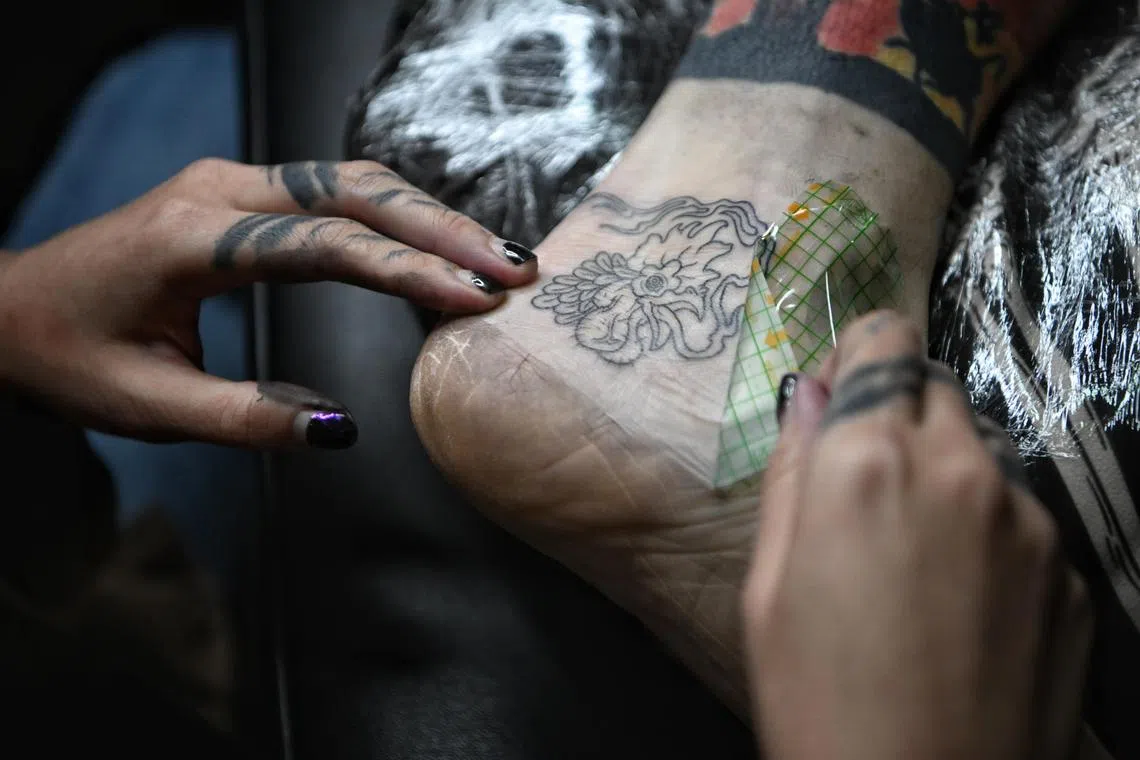
Those who practise hand-poking do not need to invest in a tattoo machine, which would cost at least a few hundred dollars.
ST PHOTO: ARIFFIN JAMAR
SINGAPORE - Once associated with secret societies and gangs, tattoos have over the years sloughed off their negative connotations to represent expressions of personality and art.
The latest trend is hand-poke tattoos, which gained popularity during the pandemic as young people used the extra time they had to experiment with body ink at home.
Such tattoos are created without a machine. Instead, a tattoo needle is dipped in ink and then poked into the skin, dot by dot.
Explaining her reasons for using this method, self-taught Singaporean tattoo artist Vanoha Chiam ( @vanoha.ink
Those who practise hand-poking do not need to invest in a tattoo machine, which would cost at least a few hundred dollars.
Ms Chiam, 27, was still a student at Nanyang Technological University in 2020 when she started exploring the idea of inking her body.
Everything she needed to learn was available online on YouTube or Reddit. Supplies were also easily procured at a local shop.
During the first two years, she tattooed clients in her bedroom, and in late 2022 she moved out to a small rented studio in Hillview.
Ms Mi-e ( @5aucepokes
“I watched many videos, bought a small hand-poking kit online, and began taking clients who were willing to let me tattoo them,” she said.
Formal training needed, say traditional artists
Some in the industry have spoken out against the trend of self-taught tattoo artists.
Mr Lionel Ng ( @lionelngtattoo
He estimates that the number of tattoo studios – including home-based ones – has shot up from around four when he joined the industry, to well over a thousand now. ST understands that there is no official number available.
“Today, with the Internet, everything is free. People are just copying art from Pinterest (an image-sharing social media platform). There is a death of originality,” he lamented.
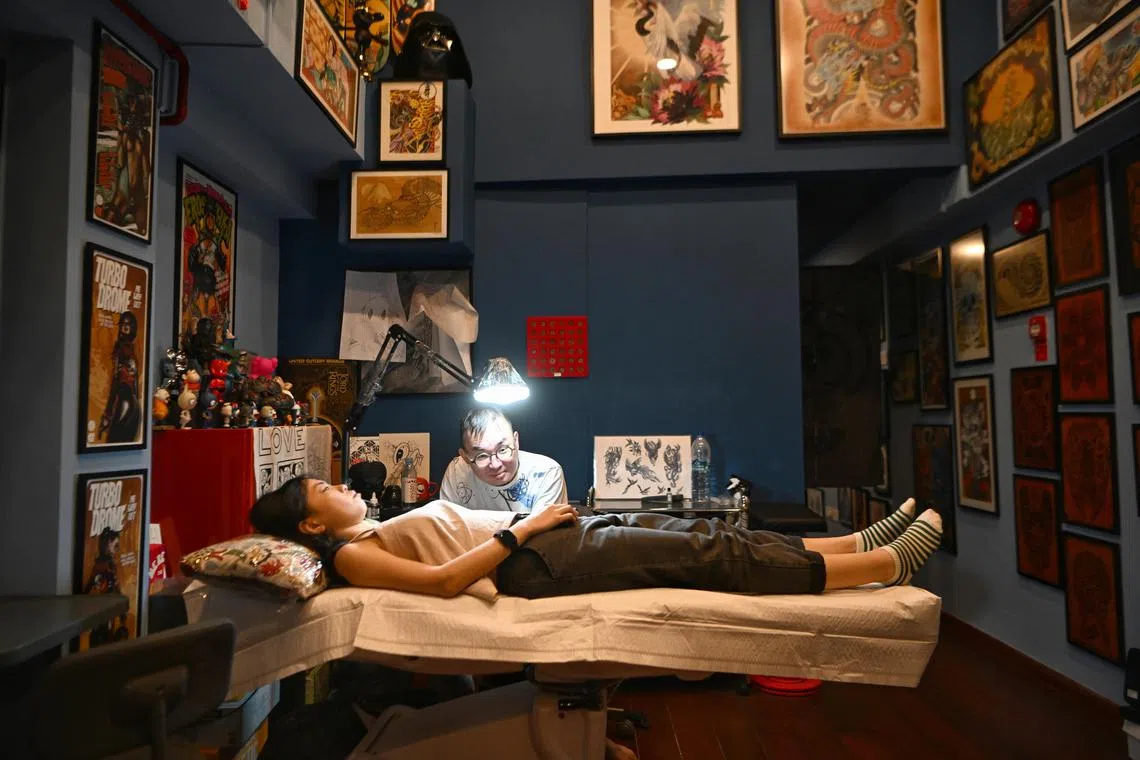
Mr Lionel Ng of Traditions Tattoo Collective with a client at his tattoo studio in Arab Street on April 19, 2023.
ST PHOTO: ARIFFIN JAMAR
Traditionally, those interested in joining the industry become an apprentice under established artists. During this period, which can last anywhere from one to three years, they pick up all the necessary skills that would give them the credentials to eventually tattoo their own clients.
Ms Valerie Chio ( @r2binks
She struck an agreement with her firm that allowed her to juggle being a tattoo apprentice with her job in architecture.
Ms Chio said: “I would leave the office at 2pm and rush to the studio every weekday, and also be at the tattoo shop every weekend.”
She became a full-time tattoo artist only in 2019, three years into the apprenticeship. Although it was a struggle to manage two jobs at the time, the process laid a strong foundation for her current profession, she said.
“When I was an apprentice, I learnt about cleanliness, basic shop-keeping, and it also helped that my mentor was always there to guide me,” said Ms Chio, who is now with Tooth and Nail Tattoo studio in Kandahar Street.
“I don’t think I’d be able to reach where I am today if I didn’t go through my apprenticeship.”
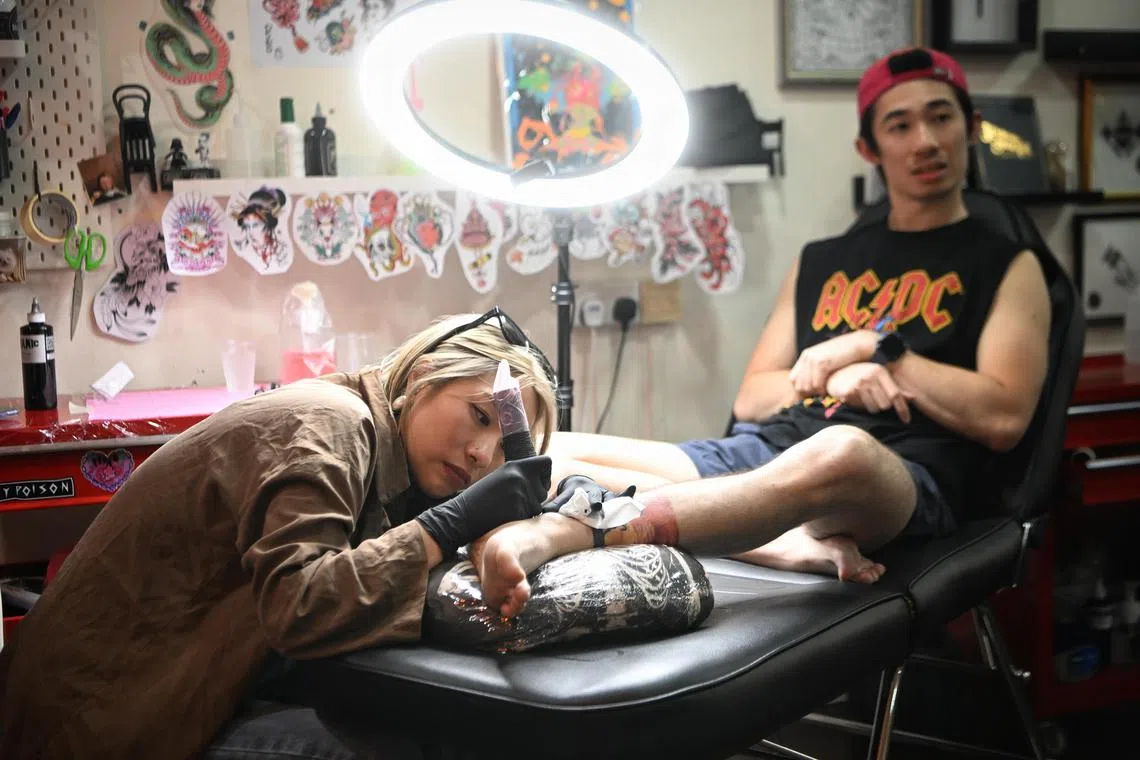
Tattoo artist Valerie Chio working on a client at Tooth and Nail Tattoo studio in Kandahar Street on April 19, 2023.
ST PHOTO: ARIFFIN JAMAR
More than just the technical skills, traditional tattooists say being an apprentice also helps them learn the proper preparation methods, and ensure that everything is done with strict precision.
Mr Ng said: “Sometimes, I see videos on TikTok of these home artists showing off the tattoos they’ve made... They have no understanding of what they are doing. The technique is wrong.
“Look at the number of home artists there are in Singapore now. How clean are they? Do they know anything about cross-contamination?”
He added that he spends around $2,000 to $3,000 every month on proper medical equipment and bed sheets, to maintain cleanliness in his studio.
But some hand-poke artists disagree.
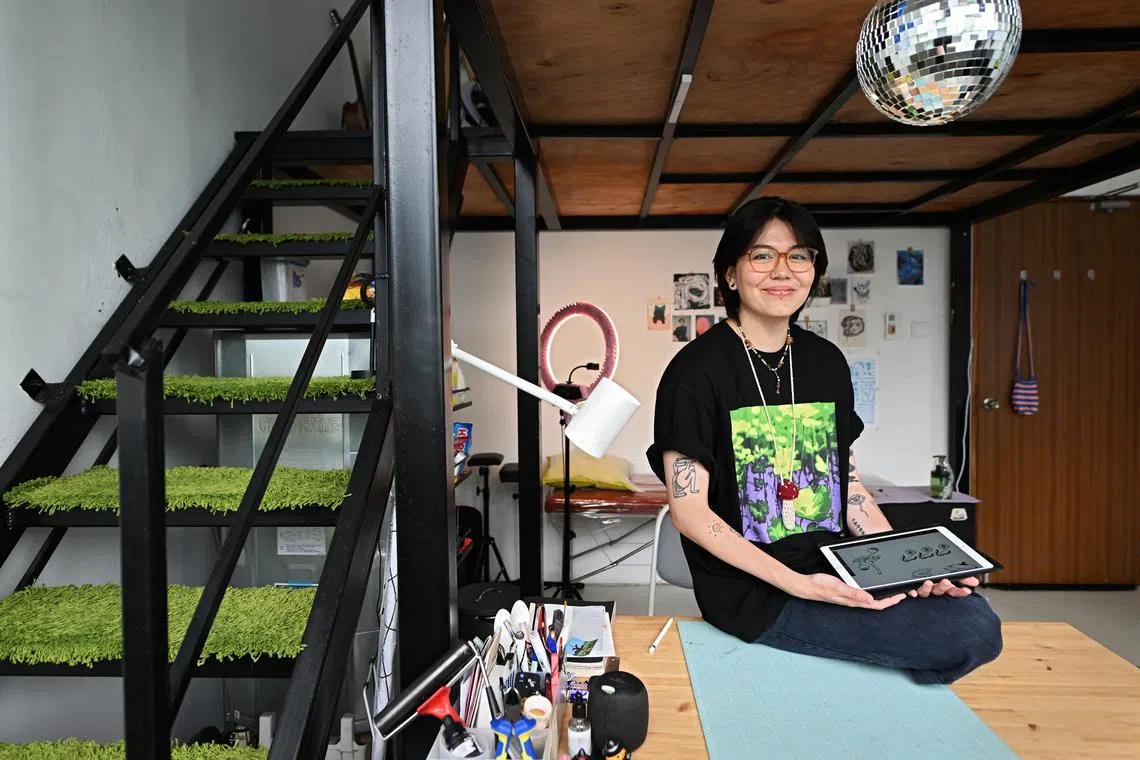
Hand-poke tattoo artist Vanoha Chiam used to be home-based but recently opened a small studio with two friends.
ST PHOTO: NG SOR LUAN
Ms Mi-e said she watches videos about sanitation, handling of equipment and tattoo aftercare online. “It helps that I used to study food science, so hygiene is very important to me... I haven’t caused an infection yet, so I can say my hygiene practices are fine.”
Ms Chiam said concerns about infections are fair, as home-based and self-taught artists usually operate on their own. “It’s really up to our due diligence to make sure whatever we do is proper and clean. I can only say that because I’m on my own, I do a lot more to make sure that everything here (in my studio) is clean.”
Health risks
Around 1 per cent to 5 per cent of people experience bacteria-infected tattoos, which can cause further complications, Dr Heng Jun Khee, a consultant at the National Skin Centre, told ST.
Said Dr Heng: “Amateur tattooists who perform home tattoos may not have proper infection prevention and control training... (This) may carry a greater risk of contracting skin infections.”
Complications range from keloid scars to neurosensory reactions. The latter refer to a constant itch as the tattoo ink stimulates sensory fibres in the skin.
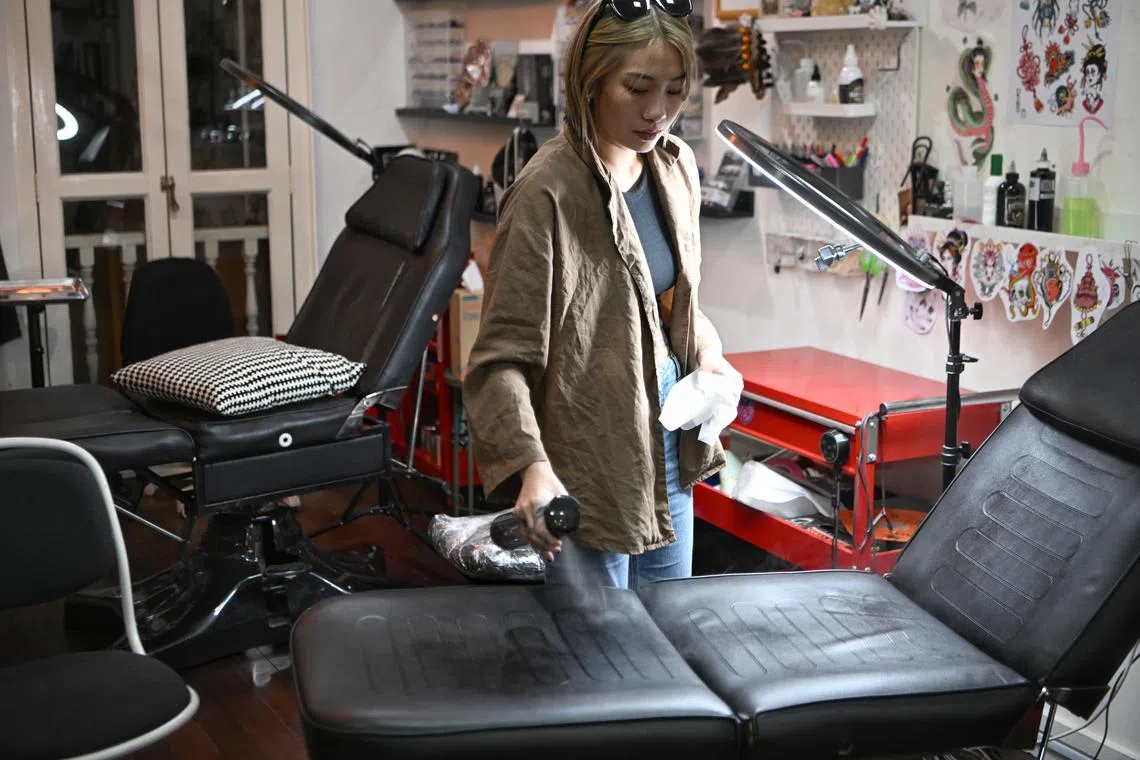
Tattoo artist Valerie Chio cleaning a work station at Tooth and Nail Tattoo studio to prepare for a new client.
ST PHOTO: ARIFFIN JAMAR
In serious cases, those who are improperly tattooed can contract hepatitis B, hepatitis C or even HIV (human immunodeficiency virus), she added.
Dr Christopher Foo, a dermatology specialist and consultant at Raffles Skin & Aesthetics Centre, said a common reaction is allergic contact dermatitis.
“This usually presents with an itchy rash and even blistering that requires treatment with cortisone creams, or oral steroids if it is more severe,” he said.
Both doctors said tattoo artists’ experience, training, hygiene precautions and equipment used can help to mitigate these complications.
They added that those looking to get inked should do their research and choose reputable tattoo studios.
Industry oversight
There are currently no plans to regulate the tattoo industry, said the Ministry of Home Affairs in response to queries from ST.
“There have not been any reported local cases of notifiable infectious disease linked to tattooing in the last few years,” it said.
“People may choose to tattoo themselves for reasons such as beauty and fashion. While there may be others who do so to show their affiliation to unlawful gangs, others may choose to tattoo themselves for beauty and fashion, and police have not observed any evidence to suggest the link between body tattoos and crime.”
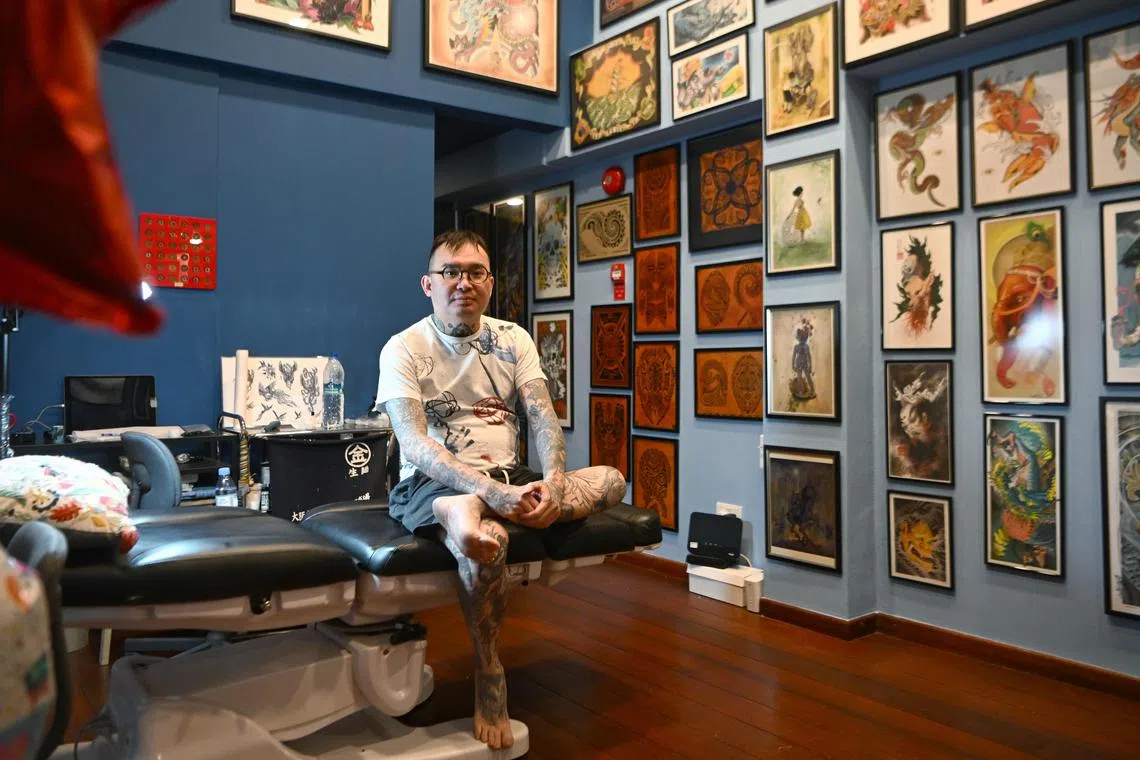
Mr Lionel Ng of Traditions Tattoo Collective wants more oversight of the industry.
ST PHOTO: ARIFFIN JAMAR
But Traditions Tattoo’s Mr Ng wants more oversight of the industry, even if it means that some studios and artists could go out of business.
“I know that by regulating the industry, it might hurt some people’s livelihoods. Maybe tattoos won’t be so accessible any more. But this also means that only the ‘proper’ artists are left on the scene,” he said.
He has begun conducting classes in his studio for those who are interested in learning the art.
But many young people like Ms Chiam are determined to forge a different path in the industry.
“I’m very aware that I’m not trying to be a (traditional) tattoo artist. I have full respect for those who have gone through an apprenticeship, and I’d never try to pretend to be like them,” she said.
“I think we are serving completely different needs.”


